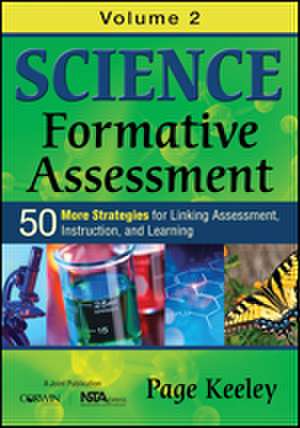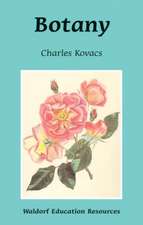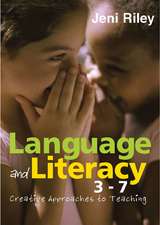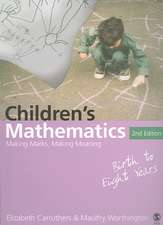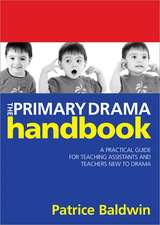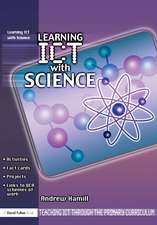Science Formative Assessment, Volume 2: 50 More Strategies for Linking Assessment, Instruction, and Learning
Autor Page D. Keeleyen Limba Engleză Paperback – 17 dec 2014
- a description of how each technique promotes student learning
- considerations for design and implementation, such as required materials, timing, modeling the technique, and grouping students
- modifications for different types of students or purposes
- caveats for using each technique
- ways the techniques can be used in other content areas
Preț: 245.89 lei
Nou
Puncte Express: 369
Preț estimativ în valută:
47.05€ • 49.26$ • 38.93£
47.05€ • 49.26$ • 38.93£
Carte disponibilă
Livrare economică 15-29 martie
Livrare express 04-08 martie pentru 27.43 lei
Preluare comenzi: 021 569.72.76
Specificații
ISBN-13: 9781452270258
ISBN-10: 1452270252
Pagini: 256
Ilustrații: Illustrations
Dimensiuni: 178 x 254 x 13 mm
Greutate: 0.45 kg
Ediția:annotated ed.
Editura: SAGE Publications
Colecția Corwin
Locul publicării:Thousand Oaks, United States
ISBN-10: 1452270252
Pagini: 256
Ilustrații: Illustrations
Dimensiuni: 178 x 254 x 13 mm
Greutate: 0.45 kg
Ediția:annotated ed.
Editura: SAGE Publications
Colecția Corwin
Locul publicării:Thousand Oaks, United States
Recenzii
"In the spirit of the first FACTS book, Volume 2 continues to build on a repository of effective strategies for assessment - as, of and for - learning. Keeley has done a great service to educators by compiling these strategies into an easy to access resource, providing the necessary background and helping to move these strategies into the “Next Generation” of science instruction."
"Teachers everywhere are spending a lot of time and energy looking for ways to increase student achievement. Well, the answer is not a big secret, nor is it expensive. Fortunately, Page Keely has an answer. Improved performance lies in using formative assessments as an integral aspect of a lesson. In this book Keely shows how 50 formative assessments, in the form of FACTs, can lead to greater student success in science."
"The Next Generation Science Standards provide a wide open opportunity for engagement with students and science. We are in a time of assessing for learning rather than assessment of learning. Page Keeley has provided 50 new ideas that educators at all grade levels can use to find out what their students understand and how that learning is progressing throughout instruction. It is easy to use and implement in your classroom. Science Assessment Volume 2 is a treasure trove of ideas that tie learning, instruction, and assessment together. It is a timely resource at the right time!"
"This book is paramount to how students learn, question, and critically think about the real world. Page Keely’s Science Formative Assessment- Volume 2: 50 More Strategies Linking Assessment, Instruction, and Learning invites teachers to purposefully engage in the complex practices of crafting authentic student discourse in fun and energetic ways. Teachers will absolutely rave about the new probes in Mrs. Page’s insightful book!"
"Differentiating instruction in science is a key pedagogical skill for teachers. Page Keely makes it seem-less for teachers in Science Formative Assessment- Volume 2: 50 More Strategies Linking Assessment. By addressing misconceptions head-on, teachers will be able to assess commonplace misconceptions and help move their students toward making a conceptual shift in scientific thought."
"Science teachers can transform their classrooms into collaborative, positive learning environments through probes highlighted in Page Keeley’s Science Formative Assessment- Volume 2: 50 More Strategies Linking Assessment. Teachers are provided strategies and probes that are designed to have their students discuss their ideas collaboratively with each other in groups, carefully listen to the ideas of their peers, modify their thinking based upon reasoning, claims, and evidence- all part of the scientific process! This informs teachers’ future instruction and builds students’ confidence and collegiality along the way."
"The probes and strategies utilized in Page Keeley’s book Science Formative Assessment- Volume 2: 50 More Strategies Linking Assessment serve as a springboard for scientific authenticity and promote inquiry in the classroom. They serve as a great foundation for checking for student understanding and guide thinking through argumentation, writing, reasoning, drawing, and discourse. As teachers of student-scientists, our job is to prepare the next generation of innovators."
"If you are a fan of Page and have her first book, volume 2 is a powerful addition to your library of formative assessment tools. If you are new to Page, you can't lose by owning both books. These 50 strategies range from quick "on the fly" techniques to thought-probing activities that link to Page's 'Uncovering Student Ideas' series."
“As a professional development provider, I am always looking for materials that translate abstract theory into concrete practice. Keeley has hit a 'home run'! This book provides extensive examples of strategies that teachers can immediately implement to inform teaching and promote learning.”
"Science Formative Assessment, Volume 2 contains a wealth of tools that encourage students to engage in practices such as scientific argumentation and discourse. By emphasizing the alignment of the FACT with Science and Engineering Practices, Keeley provides multiple ways for teachers to monitor more than the disciplinary core ideas being taught."
"Teachers everywhere are spending a lot of time and energy looking for ways to increase student achievement. Well, the answer is not a big secret, nor is it expensive. Fortunately, Page Keely has an answer. Improved performance lies in using formative assessments as an integral aspect of a lesson. In this book Keely shows how 50 formative assessments, in the form of FACTs, can lead to greater student success in science."
"The Next Generation Science Standards provide a wide open opportunity for engagement with students and science. We are in a time of assessing for learning rather than assessment of learning. Page Keeley has provided 50 new ideas that educators at all grade levels can use to find out what their students understand and how that learning is progressing throughout instruction. It is easy to use and implement in your classroom. Science Assessment Volume 2 is a treasure trove of ideas that tie learning, instruction, and assessment together. It is a timely resource at the right time!"
"This book is paramount to how students learn, question, and critically think about the real world. Page Keely’s Science Formative Assessment- Volume 2: 50 More Strategies Linking Assessment, Instruction, and Learning invites teachers to purposefully engage in the complex practices of crafting authentic student discourse in fun and energetic ways. Teachers will absolutely rave about the new probes in Mrs. Page’s insightful book!"
"Differentiating instruction in science is a key pedagogical skill for teachers. Page Keely makes it seem-less for teachers in Science Formative Assessment- Volume 2: 50 More Strategies Linking Assessment. By addressing misconceptions head-on, teachers will be able to assess commonplace misconceptions and help move their students toward making a conceptual shift in scientific thought."
"Science teachers can transform their classrooms into collaborative, positive learning environments through probes highlighted in Page Keeley’s Science Formative Assessment- Volume 2: 50 More Strategies Linking Assessment. Teachers are provided strategies and probes that are designed to have their students discuss their ideas collaboratively with each other in groups, carefully listen to the ideas of their peers, modify their thinking based upon reasoning, claims, and evidence- all part of the scientific process! This informs teachers’ future instruction and builds students’ confidence and collegiality along the way."
"The probes and strategies utilized in Page Keeley’s book Science Formative Assessment- Volume 2: 50 More Strategies Linking Assessment serve as a springboard for scientific authenticity and promote inquiry in the classroom. They serve as a great foundation for checking for student understanding and guide thinking through argumentation, writing, reasoning, drawing, and discourse. As teachers of student-scientists, our job is to prepare the next generation of innovators."
"If you are a fan of Page and have her first book, volume 2 is a powerful addition to your library of formative assessment tools. If you are new to Page, you can't lose by owning both books. These 50 strategies range from quick "on the fly" techniques to thought-probing activities that link to Page's 'Uncovering Student Ideas' series."
“As a professional development provider, I am always looking for materials that translate abstract theory into concrete practice. Keeley has hit a 'home run'! This book provides extensive examples of strategies that teachers can immediately implement to inform teaching and promote learning.”
"Science Formative Assessment, Volume 2 contains a wealth of tools that encourage students to engage in practices such as scientific argumentation and discourse. By emphasizing the alignment of the FACT with Science and Engineering Practices, Keeley provides multiple ways for teachers to monitor more than the disciplinary core ideas being taught."
Cuprins
Preface
Acknowledgments
About the Author
Chapter 1. An Introduction to 50 More Formative Assessment Classroom Techniques (FACTs)
Classroom Snapshot of Formative Assessment in Practice
Why 50 More FACTs?
Elicitation FACTs
Supporting Productive Science Talk
Next Steps
Chapter 2. Formative Assessment and Standards
FACTs and Core Disciplinary Content
FACTs and Scientific and Engineering Practices
Chapter 3. Get the FACTs! Formative Assessment Classroom Techniques
1. Always, Sometimes, or Never
2. B-D-A (Before–During–After) Drawings
3. C-E-O-SE (Commit–Explain–Observe or Obtain Additional Information–Scientific Explanation)
4. Claim Cards
5. Comments Only
6. Comparison Overlap Probes
7. Concept Attainment Cards
8. Concept Mix-Up Probes
9. Confidence Level Assessment (CLA)
10. Cross-Cutter Cards
11. CSI (Color–Symbol–Image)
12. Diagnostic Collectons
13. Enhanced Multiple Choice
14. Every Graph Tells a Story
15. Everyday Mystery Stories
16. Example, Non-Example
17. Extended Sticky Bars
18. Eye Contact Partners
19. Feed Up, Feedback, and Feed Forward
20. Fingers Under Chin
21. Four Corners Jigsaw
22. Gallery Walk
23. Group Frayer Model
24. Group Talk Feedback
25. Homework Card Sort
26. Hot Seat Questioning
27. I Think–I Rethink
28. Learning Intentions
29. Let's Keep Thinking
30. Lines of Agreement
31. Magnetic Statements
32. Matching Cards
33. More A–More B Probes
34. Opposing Claims Probes
35. Picture This
36. Plus–Delta
37. PMI (Plus–Minus–Interesting)
38. Ranking Tasks
39. RAQ (Revise, Add, Question) Feedback
40. Reflective Toss
41. Slide Sort
42. Success Indicators
43. Talk Moves
44. TAR (Target, Analogy, Reflection)
45. Thumbs Up, Down, Sideways
46. Traffic Light Sliders
47. Vernacular Probes
48. VDR (Vote, Discuss, Revote)
49. What Did I Learn Today?
50. Word Sort
Appendix: Annotated Resources for Science Formative Assessment
References
Index
Acknowledgments
About the Author
Chapter 1. An Introduction to 50 More Formative Assessment Classroom Techniques (FACTs)
Classroom Snapshot of Formative Assessment in Practice
Why 50 More FACTs?
Elicitation FACTs
Supporting Productive Science Talk
Next Steps
Chapter 2. Formative Assessment and Standards
FACTs and Core Disciplinary Content
FACTs and Scientific and Engineering Practices
Chapter 3. Get the FACTs! Formative Assessment Classroom Techniques
1. Always, Sometimes, or Never
2. B-D-A (Before–During–After) Drawings
3. C-E-O-SE (Commit–Explain–Observe or Obtain Additional Information–Scientific Explanation)
4. Claim Cards
5. Comments Only
6. Comparison Overlap Probes
7. Concept Attainment Cards
8. Concept Mix-Up Probes
9. Confidence Level Assessment (CLA)
10. Cross-Cutter Cards
11. CSI (Color–Symbol–Image)
12. Diagnostic Collectons
13. Enhanced Multiple Choice
14. Every Graph Tells a Story
15. Everyday Mystery Stories
16. Example, Non-Example
17. Extended Sticky Bars
18. Eye Contact Partners
19. Feed Up, Feedback, and Feed Forward
20. Fingers Under Chin
21. Four Corners Jigsaw
22. Gallery Walk
23. Group Frayer Model
24. Group Talk Feedback
25. Homework Card Sort
26. Hot Seat Questioning
27. I Think–I Rethink
28. Learning Intentions
29. Let's Keep Thinking
30. Lines of Agreement
31. Magnetic Statements
32. Matching Cards
33. More A–More B Probes
34. Opposing Claims Probes
35. Picture This
36. Plus–Delta
37. PMI (Plus–Minus–Interesting)
38. Ranking Tasks
39. RAQ (Revise, Add, Question) Feedback
40. Reflective Toss
41. Slide Sort
42. Success Indicators
43. Talk Moves
44. TAR (Target, Analogy, Reflection)
45. Thumbs Up, Down, Sideways
46. Traffic Light Sliders
47. Vernacular Probes
48. VDR (Vote, Discuss, Revote)
49. What Did I Learn Today?
50. Word Sort
Appendix: Annotated Resources for Science Formative Assessment
References
Index
Notă biografică
Descriere
This bestselling book offers new strategies on how to use assessment to inform instruction and learning in the science classroom.
